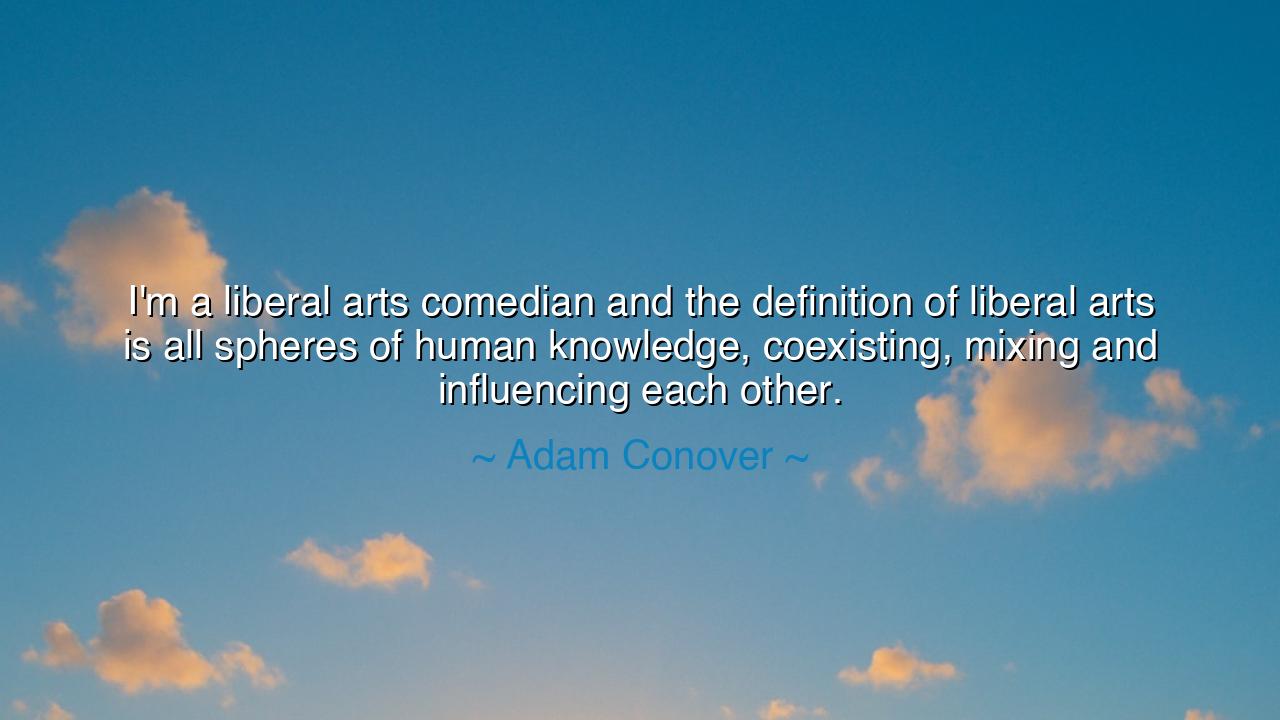
I'm a liberal arts comedian and the definition of liberal arts is
I'm a liberal arts comedian and the definition of liberal arts is all spheres of human knowledge, coexisting, mixing and influencing each other.






The words of Adam Conover—“I'm a liberal arts comedian and the definition of liberal arts is all spheres of human knowledge, coexisting, mixing and influencing each other”—resonate as a hymn to the unity of wisdom. Beneath the humor of the entertainer lies a philosopher’s heart. In his declaration, Conover reminds us that the liberal arts, long before they became a field of study, were the sacred disciplines through which humanity sought to understand the whole of existence. His words are not only about comedy—they are about the harmony of knowledge, about the truth that every branch of learning, from science to poetry, from logic to laughter, is bound together by a single purpose: to illuminate the human spirit.
In the ancient world, the liberal arts were revered as the foundation of a free mind. The Greeks and Romans spoke of them not as mere subjects, but as the path to wisdom and virtue. The trivium—grammar, rhetoric, and logic—trained the tongue and the mind, while the quadrivium—arithmetic, geometry, music, and astronomy—trained the soul to perceive order in the cosmos. A person educated in these arts was not a specialist chained to one discipline, but a complete being, whose intellect and imagination moved in harmony. When Conover calls himself a “liberal arts comedian,” he revives this ancient spirit. He sees comedy not as mere entertainment, but as a bridge between ideas—a form that gathers fragments of truth from every realm of human experience and molds them into laughter and insight.
Comedy, as he practices it, is not chaos but synthesis. It draws from history, philosophy, politics, science, and emotion, blending them as the liberal arts once blended disciplines into wholeness. This idea is profoundly classical: the philosopher Aristotle taught that wisdom arises when knowledge from different fields converges into understanding. A physician who studies ethics becomes a healer of both body and soul; a statesman who studies poetry learns to govern the heart as well as the law. In the same way, Conover’s humor—rooted in facts, reason, and human observation—mirrors this ancient ideal: it makes the audience think, laugh, and awaken all at once. For laughter, when born of truth, is one of the purest forms of enlightenment.
The power of this idea can be seen throughout history. Consider Leonardo da Vinci, who united art and science, geometry and emotion, the motion of the heavens with the curve of a smile. His genius sprang not from mastery of one field, but from the interplay of many. His mind, like the liberal arts themselves, refused to separate beauty from logic or creativity from discipline. This is the spirit that Conover invokes—the belief that progress and understanding emerge not from isolation, but from connection. When he stands before an audience, weaving humor from sociology, psychology, and history, he follows in the footsteps of those ancient thinkers who saw all knowledge as one great conversation.
In calling himself a “liberal arts comedian,” Conover also expresses reverence for curiosity itself—the boundless hunger to understand the world in its totality. He suggests that wisdom lies not in knowing everything, but in seeing how everything relates. The scientist who understands art perceives elegance in an equation; the artist who studies science finds structure in beauty. In every act of creation, in every pursuit of truth, there is a blending—a dance between disciplines that mirrors the dance of the universe itself. When these spheres “coexist, mix, and influence each other,” they give rise to the richness of human civilization.
His words also carry a moral teaching: that division of knowledge weakens the soul, just as division among people weakens society. In the modern age, where knowledge is fragmented and specialists live in silos, Conover’s reflection becomes a reminder of our shared intellectual ancestry. To embrace the liberal arts is to reject narrowness, to see that science without philosophy becomes soulless, and philosophy without art becomes dry. The liberal mind, like the liberal heart, welcomes all perspectives—not to dilute them, but to strengthen each through harmony.
The lesson, then, is both timeless and urgent: seek unity in diversity. Be not content to live within the walls of one discipline or one idea. Study widely, think freely, and let every form of learning enrich the others. Let your mind be like the ancient lyre, each string tuned to a different note of knowledge, yet resonating in one melody of understanding. For this is the essence of the liberal arts—and of wisdom itself: that truth is never one thing, but the meeting of many.
Thus, Adam Conover’s words, though spoken with humor, carry the weight of an ancient truth. To live as a “liberal arts comedian” is to live as a liberal arts human being—one who honors the wholeness of the world, who sees that laughter, logic, and love are all expressions of the same divine curiosity. And so the wise will remember: knowledge, when divided, diminishes; but when united, it enlightens.






AAdministratorAdministrator
Welcome, honored guests. Please leave a comment, we will respond soon